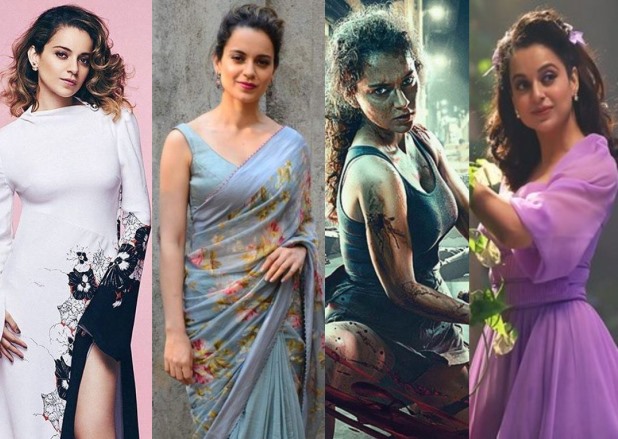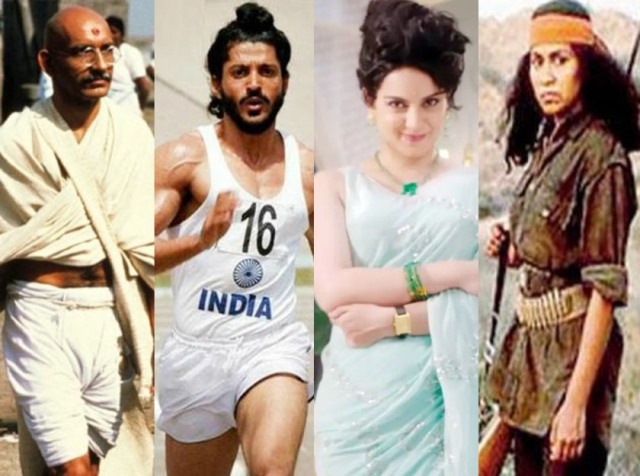Indians are looking for their heroes, past or present. Even villains are okay, if they are and do things larger than life. Ready subjects with potential for profits have encouraged a trend in the shape of biographical films – biopics for short.
As film-goers hunger for more, film-makers braving the Covid-19 pandemic, find it necessary to work indoors on research and writing before venturing out.
It is not new. Film analyst Gautam Kaul says this genre came from Hollywood like much else over the last century. Audiences look for stories that inspire and inform. Stories of success and fortitude are appealing. Biopics are dramatized for mass acceptance and visual appeal. Literary/cinematic licence is taken, with approval of the subject, if alive. Call it a sponsored exercise, but none complains, save some film critics, if the end-product is entertaining and has the right message.
If a biopic is re-living the past, step aside for a quick review, both global and Indian.
The world’s first recorded biopic was in 1900, expectedly from the French and predictably, on Joan of Arc. She was repeated almost a century later in 1999. The world’s most filmed individuals are Jesus Christ, Vladimir Lenin, Adolf Hitler and the Kennedys. Hollywood’s Genghiz Khan, the Mongol warrior, was played by John Wayne and later, Omar Sharif. Che Guevara was another repeated hero.
India’s oldest biopic was on Shivaji. A film on Dr Kotnis, who died during a medical mission to China, was made within months, with international flavour. Southern Indian cinema dipped into northern India’s history to make Chanakya And Chandragupta, in 1977. The two characters were played by Telugu stalwarts Akineni Nageswara Rao (ANR) and N T Ramarao (NTR). Bengali actor Sarvadaman Banerjee portrayed two persons who lived a millennium apart — eighth century Adi Shankaracharya (1983) and 19th century Swami Vivekananda (1994).
The first internationally mounted biopic on an Indian was Gandhi (1982). Made by Richard Attenborough, it won multiple Oscars, including one for British-Indian actor Ben Kingsley who played Gandhi and another for Bhanu Athaiya, who dressed up the characters. Strongly author-backed biopics have done well. Bandit Queen was on Phoolan Devi, Rangrasiya about painter Raja Ravi Varma.
Sports, science, crime – everything sells on the celluloid. Many recent biopics like Dangal (on Phogat family’s girl wrestlers), Mary Kom (the boxer-lawmaker who remains an Olympics hopeful) and Bhaag Milkha Bhaag (on sprinter Milkha Singh, the “flying Sikh”) have won critical and box office acclaim. Shah Rukh Khan led a women’s hockey team to victory and also redeemed his own honour in Chak De India, Akshay Kumar played a men’s hockey coach that brought India its first Olympics victory. It it is now Ajay Devgn’s turn to play football coach, Syed Abdul Hakim, in Maidaan.
Badminton star Saina Nehwal is being portrayed by Parineeti Chopra. Shabash Mithu is on one of the great woman cricketers, Mithali Raj. She will be brought alive by Tapsee Pannu who, along with Bhumi Pednekar, had played Haryana housewives turning champion shooters in Sandh Ki Ankh.
The list cannot be complete without a mention of 83, the year India won its first World Cup under Kapil Dev’s captaincy. Indeed, cricket has more than its share. Lives of M S Dhoni, Sachin Tendulkar and Mohammed Azharuddin have transformed on the cinema.
Of science-related events, India’s Mars Mission received a filmy leg with Mission Mangal and so did the nuclear tests of 1998 in Pokhran. The Nambi Effect is about rocket scientist Nambi Narayanan, charged and punished, but eventually exonerated.
Years after Shabana Azmi portrayed a woman mafia chief in Godmother, Aaliya Bhatt is playing Gangubai Kathiawadi, a brothel keeper in Mumbai’s Kamathipura, the red light zone.
Freedom fighters and faujis are natural heroes. Vicky Kaushal is busy portraying freedom fighter, Sardar Udham Singh and also Field Marshal SHFJ Manekshaw, the army chief during Bangladesh liberation. Pippa is the title of another hero of that war, Brigadier Balram Singh Mehta. The role is being enacted by Ishan Khatter.
Elections in Tamil Nadu add froth to the talk of forthcoming biopic, Thalaivi, the leader in Tamil, on Jayalalithaa. The role is being enacted by Kangana Ranaut who played Rani Laxmibai of Jhansi with great aplomb. So popular is the Jayalalithaa cult that Anushka Shetty is playing it in series on the digital media.
But there are problems of comparisons and contrasts, since ‘Amma’ died just four years back. Many of the biopics listed here have earned controversy and complaints before courts. It may be genuine grouse of some family member, or just seeking five minutes of fame. These days, it is very easy for ‘sentiments’ being ‘hurt’ and interested quarters taking to agitation and violence.
Does transition from cinema to politics qualify for a biopic? Rajinikant remains elusive, while Kamal Haasan has followed the footsteps of M G Ramachandran (MGR) and other Tamil and Telugu film stars. Besides Jayalalithaa, biopic has been made in Mollywood (M for Madras, Chennai) only on NTR. This is because the Telugu cinema legend founded a political party and became Chief Minister of Andhra Pradesh. His role is performed by one of his look-like sons.
From the pages of history, Prithviraj Chauhan is being resurrected by Ajay Devgn. His portrayal of Tanhaji, Shivaji’s lieutenant, was a big hit last year.
There is no dearth of subjects for biopics, if only directors with imagination can get financiers. People, both real and what are literary creations, have been filmed. Anarkali, the courtesan in Mughal Emperor Akbar’s court, the lady love of Prince Salim was the central figure in Mughal-e-Azam, considered the greatest film made in India. Originally, hers was a character in a play written in the last century. But try telling this to anyone in South Asia. Why, even the Ramayan and Mahabharat TV serials, that can be termed collective biographies, were avidly watched by millions last year. The three-decade gap did not matter because characters from these epics are real in public mind.
Anarkali is also real in popular lore, like Padmavati or Rani Padmini, who probably never existed. Protestors who turned violent during the making and release of the film Padmavat did not heed when reminded that she was but medieval era poet Malik Jayasi’s creation. But then, ‘sentiments’ were ‘hurt’, turning reel-versus-reality debate rowdy.
Biopics on national leaders are few. There is none on Jawaharlal Nehru, although he figured in many films. Lal Bahadur Shastri was clubbed with Subhas Bose into a forgettable ‘thriller’ that sought to show the erstwhile Soviet Union conspiring to eliminate Indian leaders. Although a counter-point to Nehru, Sardar Patel received decent treatment from Ketan Mehta. Indira Gandhi remained fictionalized, portrayed by Suchitra Sen in Aandhi.
The trend now is of election-time political potboilers. Thackeray on Shiv Sena founder did well. But the release of Prime Minister Narendra Modi’s biopic just before the 2019 general elections became controversial and was delayed. But no protest or compunction prevented Accidental Prime Minister, on his predecessor, Dr Manmohan Singh. If the former was an out-and-out glorification, the latter was bad caricaturing. Neither did well commercially.
Bollywood does not film its own greats. Marathi film Harishchandrachi Factory depicted pioneer Dadasaheb Phalke’s struggle in making of India’s first film, Raja Harishchandra in 1913. Shyam Benegal made Bhumika on Marathi actress Hansa Wadkar, based on her autobiography. Dev Anand has left his memoirs, and many veterans have begun to publish theirs. Prospects abound. Of those still in action, Sanjay Dutt figures in and as Sanju that shows him, warts and all, yet a lovable person.
Expertise to make biopics is ready for export. Shyam Benegal is making Bangabandhu on Sheikh Mujibur Rahman, whose founding a nation, ruling it, but being killed by his own men makes for a tragedy with Shakespearean touches.
The writer can be reached at mahendraved07@gmail.com




